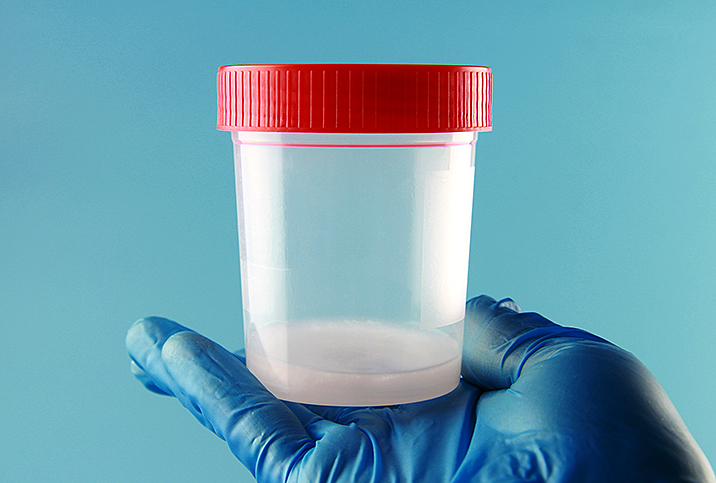Immunoinfertility Turns Semen Against Sperm

Did you know a man's semen can treat sperm as an invasive presence if it contains unusual immunoglobulins?
"Antisperm antibodies are a part of the human immune system that fight against sperm. This happens as a result of the immune system incorrectly identifying sperm as a foreign invader," said urologist Justin Houman, M.D., a men's sexual and reproductive health specialist at Tower Urology in Los Angeles. "As a result, it targets the sperm, ultimately damaging and killing them."
Sounds like something out of science fiction: The very fluid that carries sperm out of the penis becomes a hostile environment for sperm. It's true. And antisperm antibodies are present in a fair number of infertile men, anywhere from 9 percent to 36 percent, though there is no direct evidence to indicate these antibodies are the cause of infertility.
How do you know if you have antisperm antibodies? Can you test for them? Let's find out.
What are antisperm antibodies?
"Antisperm antibodies are special proteins called immunoglobulins that are directed against sperm [and bind to them] and can interfere with their function," said Barry Witt, M.D., the medical director of WINFertility and Greenwich Fertility in Connecticut, a board-certified reproductive endocrinologist who has been offering reproductive care for more than 25 years. He explained that these antibodies can be found in the semen, cervical mucus and serum (blood) of both males and females.
Antisperm antibodies are made by the immune system and target sperm when the body sees sperm as foreign bodies, explained Barrett Cowan, M.D., a urologist and male fertility specialist at Kindbody, a national network of fertility clinics.
"This most commonly occurs after a vasectomy, when sperm are still being produced and can't get out due to blockage from the vasectomy," he said. "So the body senses the sperm as foreign bodies and uses the immune system to break them down. They also can occur after significant testicular trauma or after what is referred to as testicular torsion, during which the testicle loses its blood supply."
If too many antisperm antibodies come into contact with a man's sperm, it becomes difficult for the sperm to fertilize an egg. This is called immunological infertility, or immunoinfertility.
How do antisperm antibodies attack organisms that are supposed to be there?
Antisperm antibodies are created when a man's sperm comes into contact with his immune system. Normally, a person's testicles keep sperm away from the rest of the body—the immune system included—using the "blood-testis barrier."
"Disruptions in this barrier can allow exposure of these sperm proteins to the immune system, resulting in the generation of antisperm antibodies," Witt said.
The most common causes of this barrier disruption, according to Witt, are:
- Surgery, such as a vasectomy or testicular biopsy
- Testicular trauma
- Testicular torsion
- Testicular infections, such as mumps orchitis
However, Marco Mouanness, M.D., an OB-GYN at Rejuvenating Fertility Center in Manhattan, added that there are multiple theories about why antisperm antibodies occur. According to Mouanness, other causes could be sexually transmitted diseases (STDs), inflammation and immunosuppression.
"Men who have had a vasectomy and subsequent reversal all have antisperm antibodies, but typically not at levels which are clinically significant," Cowan said. "Those who had prior testicular trauma, surgery or torsion are at risk."
Mouanness explained that men at risk also include those who have systemic autoimmune disease or immunodeficiency; a problem in the passageway that carries sperm from the testicles to the outside, such as men with cystic fibrosis; or multiple previous sexually transmitted infections (STIs).
How can antisperm antibodies be detected?
Immunoglobulin A (IgA) and immunoglobulin G (IgG) antibodies are the predominant antibodies found in semen, Witt said. Several types of tests can detect antisperm antibodies. In men, the most commonly performed test is the immunobead test, he said.
"The immunobead test gives information about the type and presence of the immunoglobulins and their localization specifically on the sperm: head, midpiece or tail, or even covering the entire sperm," Witt said.
The immunobead test uses small beads covered with antibodies specific to IgG and IgA antibodies. The beads adhere to sperm with antibodies on their surface (the antisperm antibodies).
Male patients masturbate to provide a semen sample for this test. Witt said patients can also undergo an indirect immunobead test, which detects antisperm antibodies in seminal fluid, blood or cervical mucus where there is no sperm present.
Witt noted that according to the American Society for Reproductive Medicine, antisperm antibody testing should not be performed as part of the routine initial evaluation of male infertility. The society advises that testing should be reserved for cases where there is a history of one of the risk factors noted above or a significant agglutination of the sperm—where they are stuck together in clumps—in semen.
"Studies on the benefits of testing for antibodies and treating positive tests are not consistent," Witt said. "There is no reason to test for antisperm antibodies if in vitro fertilization [IVF] with intracytoplasmic sperm injection [ICSI] is already planned, since they would be irrelevant to the outcome in that case."
What are the best workarounds?
"People have tried to suppress the immune system with medications to get rid of the antibodies, but unfortunately, this does not typically work," Cowan stated. "Sperm can still function in the presence of low degrees of antibody presence, but if severe, the best [option] is to go through IVF, as the presence of antibodies themselves does not damage the sperm DNA."
If the antisperm antibody levels are high, IVF with ICSI is the best option for an affected couple to conceive.
Mounanness said actions to manage antisperm antibodies have three main aims:
- To decrease the production of antisperm antibodies via the use of condoms or systemic steroids
- To remove antisperm antibodies via sperm washing or treatment with antibody-enzyme degraders, such as IgA protease or immunodepletion, or anti-ASA antibodies
- To work with assisted reproductive technologies (ART), such as IVF
Witt explained more about assisted reproductive techniques and how they work. Antisperm antibodies may impair the ability of the sperm to fertilize the egg, so IVF with ICSI can be used to overcome this issue. With ICSI, sperm is injected directly into the egg under a microscope to fertilize the egg, so the antibodies attached to the sperm cannot interfere with the fertilization.
Antisperm antibodies can also result in sperm agglutination in the semen, where the sperm are seen to be "stuck together," which can interfere with their ability to swim (motility). Some studies have suggested intrauterine insemination (IUI) may benefit this situation by washing and processing the sperm before insemination, which may increase sperm motility. But Witt noted the data is limited with regard to improved pregnancy rates.
Mouanness explained that both the prevalence and magnitude of the role of antisperm antibodies in unexplained infertility remain controversial. For now, he said, there is no data to suggest individuals with antisperm antibodies have increased fertility problems.
"But if they do have fertility problems and they are diagnosed with the presence of antisperm antibodies, then further treatment can be warranted," he said.


















